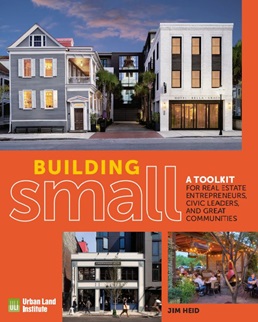Building Small

A Toolkit for Real Estate Entrepreneurs, Civic Leaders, and Great Communities
Small-scale, incremental, real estate development offers a growing alternative to more conventional approaches. It helps create more authentic places, acts as a magnet for new investment, helps attract talent-based employment, all while fostering a more resilient local economy. This in turn helps communities better differentiate themselves when seeking new investment in an increasingly competitive landscape. For its virtues, however, entrepreneurial real estate developers working to 'build small' face jurisdictional and capital inertia that impedes bringing this approach to scale.
Drawing on extensive research and using case studies, interviews with over 100 developers, and first-hand knowledge gained from tours through 15 cities, author Jim Heid articulates what small-scale development means, why it is essential to communities of every size and location, and how entrepreneurial developers and community leaders can help remove the obstacles to small—resulting in more successful projects and a better approach to building community.
What readers are saying about Building Small: “This book captures a profound truth about placemaking: that Building Small can foster economic prosperity without sacrificing human vitality. By focusing on context and on incremental, varied, and fine-grained development, Building Small allows places evolve over time to encourage and reflect the life within them.” — Mark Elison Hoversten, PhD, FASLA, AICP, Dean, College of Design, North Carolina State University
Book Summary: Small-scale, incremental, real estate development offers a growing alternative to more conventional approaches. It helps create more authentic places, acts as a magnet for new investment, helps attract talent-based employment, all while fostering a more resilient local economy. This in turn helps communities better differentiate themselves when seeking new investment in an increasingly competitive landscape. For its virtues, however, entrepreneurial real estate developers working to 'build small' face jurisdictional and capital inertia that impedes bringing this approach to scale.
Drawing on extensive research and using case studies, interviews with over 100 developers, and first-hand knowledge gained from tours through 15 cities, author Jim Heid articulates what small-scale development means, why it is essential to communities of every size and location, and how entrepreneurial developers and community leaders can help remove the obstacles to small—resulting in more successful projects and a better approach to building community.
What readers are saying about Building Small: “This book captures a profound truth about placemaking: that Building Small can foster economic prosperity without sacrificing human vitality. By focusing on context and on incremental, varied, and fine-grained development, Building Small allows places evolve over time to encourage and reflect the life within them.” — Mark Elison Hoversten, PhD, FASLA, AICP, Dean, College of Design, North Carolina State University


